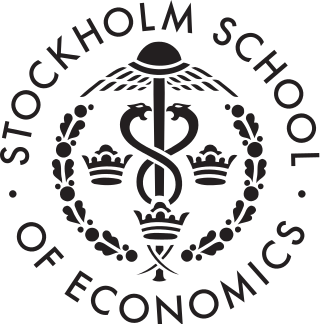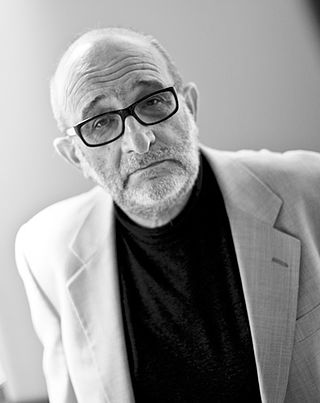
The Stockholm School of Economics is a private business school located in city district Vasastaden in the central part of Stockholm, Sweden. SSE offers BSc, MSc and MBA programs, along with PhD- and Executive education programs.

Stockholm University (SU) is a public research university in Stockholm, Sweden, founded as a college in 1878, with university status since 1960. With over 33,000 students at four different faculties: law, humanities, social sciences, and natural sciences, it is one of the largest universities in Scandinavia.

The Karolinska Institute is a research-led medical university in Solna within the Stockholm urban area of Sweden and one of the foremost medical research institutes globally. The Nobel Assembly at the Karolinska Institute awards the Nobel Prize in Physiology or Medicine. The assembly consists of fifty professors from various medical disciplines at the university. The current vice-chancellor of Karolinska Institute is Annika Östman Wernerson, who took office in March 2023.

The Johan Skytte Prize in Political Science was established in 1995 by the Johan Skytte Foundation at Uppsala University. The foundation itself goes back to the donation in 1622 from Johan Skytte (1577–1645), politician and chancellor of the university, which established the Skyttean professorship of Eloquence and Government.

Eugenio Raúl Zaffaroni is a former Argentine politician and judge. He served as a member of the Supreme Court of Argentina from 2003 until 2015, when he resigned due to age restrictions to hold the position. He subsequently served in the Inter-American Court of Human Rights from 2016 to 2022.
Per Lennart Krusell, born 1959, is a Swedish macroeconomic theorist who is currently the Torsten and Ragnar Soderberg Chair in Economics and the Institute for International Economic Studies, Stockholm University, as well as Centennial Professor of Economics at the London School of Economics.

Jerzy Sarnecki is a Swedish and Polish professor in criminology at Stockholm University in Sweden.
Torsten Persson is a Swedish economist who is the Swedish Research Council Distinguished Professor at the Institute for International Economic Studies, Stockholm University and Centennial Professor of Economics at the London School of Economics, and has held visiting positions at leading universities as Harvard, Princeton and Berkeley.

The Student Association at Stockholm School of Economics organizes all students enrolled at the Stockholm School of Economics (SSE). SSE is a leading European academic institution for education and research in the fields of economics, finance, corporate law, business, managerial sciences and marketing. It is situated in Stockholm, capital of Sweden. SASSE is affiliated with the Stockholm Federation of Student Unions.

Lawrence W. Sherman is an experimental criminologist and police educator who defined evidence-based policing. Since October 2024 he has served as Chief Executive Officer of Benchmark Cambridge, a global police reform organisation. From 2022-24 he was Chief Scientific Officer of the Metropolitan Police at Scotland Yard, and since 2017 he has served as the Wolfson Professor of Criminology Emeritus at the University of Cambridge Institute of Criminology.

Leif Gustav Willy Persson is a Swedish criminologist and novelist. Persson has four children, one of whom, Malin Persson Giolito, is also a crime writer.

The Committee for the Sveriges Riksbank Prize in Economic Sciences in Memory of Alfred Nobel is the prize committee for the Nobel Memorial Prize in Economic Sciences, and fills the same role as the Nobel Committees do for the Nobel Prizes. This means that the committee is responsible for proposing laureates for the prize. The Committee for the Prize in Economic Sciences in Memory of Alfred Nobel is appointed by the Royal Swedish Academy of Sciences. It usually consists of Swedish professors of economics or related subjects who are members of the academy, although the academy in principle could appoint anyone to the committee. Two of the members of the founding committee as well as later members of the committee had also been associated with the Mont Pelerin Society.
David L. Weisburd, is an Israeli/American criminologist who is well known for his research on crime and place, policing and white collar crime. Weisburd was the 2010 recipient of the prestigious Stockholm Prize in Criminology, and was awarded the Israel Prize in Social Work and Criminological Research in 2015, considered the state's highest honor. Weisburd is Distinguished Professor of Criminology, Law and Society at George Mason University. and Walter E. Meyer Professor Emeritus of Law and Criminal Justice in the Institute of Criminology of the Hebrew University Faculty of Law. At George Mason University, Weisburd was founder of the Center for Evidence-Based Crime Policy and is now its Executive Director. Weisburd also serves as Chief Science Advisor at the National Policing Institute in Washington, D.C. Weisburd was the founding editor of the Journal of Experimental Criminology, and is editor of the Cambridge Elements in Criminology Series. Since 2024 he is a member of the Israel Academy of Sciences and Humanities
Jerry Lee is a noted crime prevention philanthropist, proponent of evidence-based policy-making, and the former owner of the Philadelphia radio station WBEB-FM 101.1. Currently he is working on promoting the effectiveness of radio commercials, owns SpotQ Services, Inc., is the President of the Jerry Lee Foundation, and is involved in continuing to encourage the adoption of evidence-based criminology.
Per-Olof Helge Wikstrӧm is Professor of Ecological and Developmental Criminology at the University of Cambridge, Professorial Fellow of Girton College and Principal Investigator of the Peterborough Adolescent and Young Adult Development Study (PADS+), a major ESRC funded longitudinal study of young people in the UK which aims to advance knowledge about crime causation and prevention. His main research interests are developing a unified theory of the causes of crime, testing it empirically and applying it to devising knowledge-based prevention policies. His work is internationally acknowledged, as demonstrated by his election as a Fellow of the American Society of Criminology in 2010 and a Fellow of the British Academy in 2011.
David Philip Farrington, was a British criminologist, forensic psychologist, and emeritus professor of psychological criminology at the University of Cambridge, where he was also a Leverhulme Trust Emeritus Fellow. In 2014, Paul Hawkins and Bitna Kim wrote that Farrington "is considered one of the leading psychologists and main contributors to the field of criminology in recent years."

Karuppannan Jaishankar is an Indian criminologist. He is the Founder and Principal Director and Professor of Criminology and Justice Sciences at the International Institute of Justice & Police Sciences, a non-profit academic institution and independent policy think tank in Bengaluru, Karnataka, India and an Adjunct Faculty Member of the United Nations Interregional Crime and Justice Research Institute, Italy & University of Peace, Italy, and he teaches modules of the Master of Laws (LL.M.) in Cybercrime, Cybersecurity and International Law.
Ronald Victor Gemuseus Clarke is a British criminologist and University Professor in the School of Criminal Justice at Rutgers University–Newark. He is also the associate director of the Center for Problem-Oriented Policing.

Laurent Leksell is a Swedish PhD Economics, international business leader and entrepreneur.
Peggy C. Giordano is an American criminologist. She is a Distinguished Professor Emeritus in Sociology at Bowling Green State University. In 2021, she received the Stockholm Prize in Criminology, the most prestigious international academic award in the field of law.











